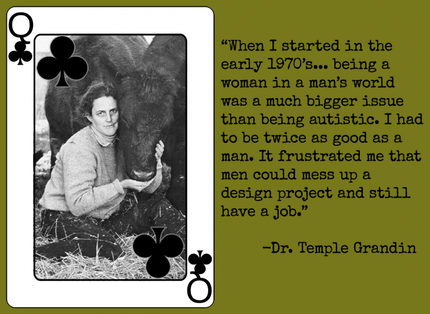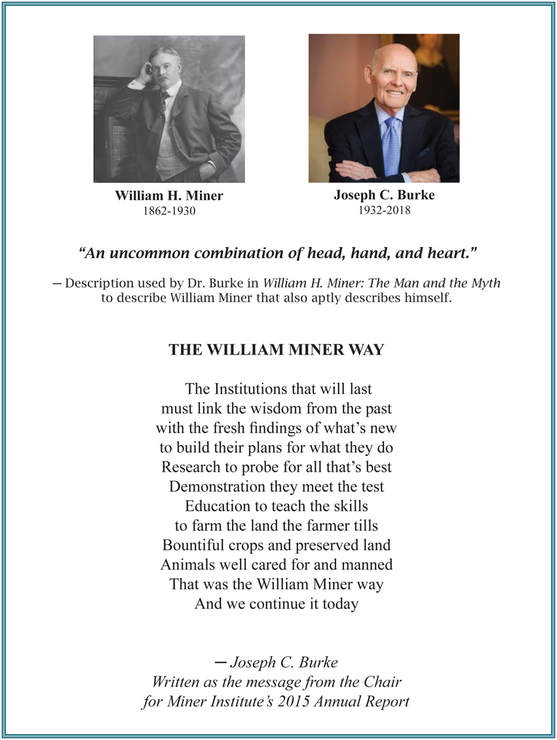 As a member of a team of people who helped organize and coordinate an agriculture talk given by Dr. Temple Grandin in late October at Beekmantown High School, I set up a Miner Institute display along with other displays showcasing student projects and the other partners who had collaborated on the event. A young woman holding a Miner Institute annual report caught my eye and I struck up a conversation with her. She indicated that she was a student at UVM and had traveled from Burlington to see Dr. Grandin. She told me that Dr. Grandin’s story had inspired her to study wildlife and fisheries biology in college. She choked back tears, as did I, as she told me that as an autistic woman Dr. Grandin has been an idol to her. Dr. Grandin is a world-renowned autism advocate, best-selling author, animal welfare and behavior expert and a professor of animal science at Colorado State University. She is well known for relating her personal experience as someone with autism to provide an interesting perspective on how thinking differently can provide opportunities. She has been able to utilize her specialized thinking to help her better understand animal behavior and has designed livestock handling facilities that are used widely around the globe because they are less stressful for animals. Dr. Grandin arrived on a Tuesday evening. She travels with two assistants who also take care of book sales for her. Dr. Grandin stayed at the Lundy Guest House at Miner Institute. Her day on Wednesday included an autism talk at the Rainbow Banquet Hall with 900 people followed by lunch and a book signing. She then came for a quick tour of Miner Institute’s barns before heading to dinner with folks from the Autism Alliance of Northeastern NY – who funded her trip to the North Country – followed by the evening agriculture-focused talk at Beekmantown High School. On Thursday morning before heading to Rhode Island for her next event, Dr. Grandin visited with some Miner Institute staff, local farmers, and animal science students from Vermont Technical College and the University of Vermont. I worked with Sara Bull from Cornell Cooperative Extension of Clinton County; Anja Bouchard from the Clinton-Essex-Franklin Library System; and Veronique Krohn, Agricultural Education Teacher & FFA Advisor at Beekmantown High School. We worked on the logistics and details for the talk at Beekmantown High School, although Anja also coordinated travel plans and scheduling with Dr. Grandin’s team. Veronique and the entire Beekmantown Central School community – students and faculty alike – pulled out all the stops to showcase their school and their programs. It was truly incredible to see such teamwork and camaraderie on display as everything came together for a really great event. "Many of my students were completely blown away by the experience. They said they couldn't believe how well spoken she was and that she seemed very grounded and true to her roots. It was truly a once in a lifetime experience that they will remember for years to come," Veronique said adding that $300 was raised to benefit the FFA program at Beekmantown through the sale of raffle tickets at the event. When I first sat down in fall 2017 to start discussing plans to bring Dr. Grandin to the North Country, I was excited to be a part of making it happen. I had no idea that I was embarking on something that would be truly transformative. - Rachel Dutil
2 Comments
 For nearly 40 years, the vision and leadership of Dr. Joseph C. Burke helped shape Miner Institute into the organization it is today. Dr. Burke spent years tirelessly researching and then writing a comprehensive biography of William Miner, bringing Miner’s incredible story to the North Country that has so greatly benefitted from his generosity. Dr. Burke was passionate about preserving the legacy of William and Alice Miner and ensuring that their vision for the North Country continues to live on. Dr. Burke passed away at his home in Albany on Aug. 3, 2018. A celebration of his life was organized by his family and held at Miner Institute on Oct. 6. Expressing exactly what Dr. Burke has meant for Miner Institute is difficult to put into words. Dr. Burke was an unusually involved and engaged chair of the board, spending countless hours walking around the Miner grounds interacting with employees and visitors and was genuinely interested in getting to know the staff and students who were helping to carry out William Miner’s vision. The Heart’s Delight Farm Heritage Exhibit opened in 2003 – 100 years after William and Alice Miner started building Heart’s Delight Farm. The exhibit pays tribute to William and Alice Miner and the development of their expansive farm in the early 1900s. The exhibit attracts nearly 2000 visitors annually, providing Miner Institute with an opportunity to showcase all that William Miner has done for the North Country and also helping to familiarize the general public with agriculture – past and present as our horse and dairy barns are also open to visitors. The exhibit’s existence is due in large part to Dr. Burke’s insistence that William Miner’s story be preserved and shared and his vision for how that could be accomplished. On October 9, 2012 Miner Institute dedicated its main education building as the Joseph C. Burke Education and Research Center. In remarks he gave at the dedication ceremony, Dr. Burke said “My name on this building really stands for all who have labored for over half a century to make William Miner’s dream a reality.” Dr. Burke said that he was honored to have a Miner Institute building bear his name, but added that it was really about the Spirit of Heart’s Delight Farm and the people who work at Miner Institute. “You’re part of a larger thing that’s gone on and on,” Dr. Burke said to the staff in attendance. “The trees and the fields are beautiful, but they’ve always been there. It’s really the people working together that makes all the difference in the world.” Dr. Burke would undoubtedly count strategic planning as his proudest accomplishment for Miner Institute. In 2012, Dr. Burke remarked that strategic planning was the contribution he was most proud of for Miner Institute, because he recognized how important it was for any organization to measure and achieve its goals. “He was so passionate about understanding and ensuring that William Miner’s vision for the Institute endured. He constantly pushed us to consider our mission – research, education, and demonstration – and how we could achieve the next milestone. He was never satisfied with the status quo – no matter how successful it might be. He would ask: ‘What’s next? How can we do a better job of pushing forward Miner’s legacy?’ He constantly encouraged us to keep moving forward,” Dr. Rick Grant said. Dr. Burke’s leadership and insight will be dearly missed but never forgotten. |
Archives
March 2022
Categories
All
|

1034 Miner Farm Rd. Chazy, NY 12921
www.whminer.org
518-846-7121
 RSS Feed
RSS Feed